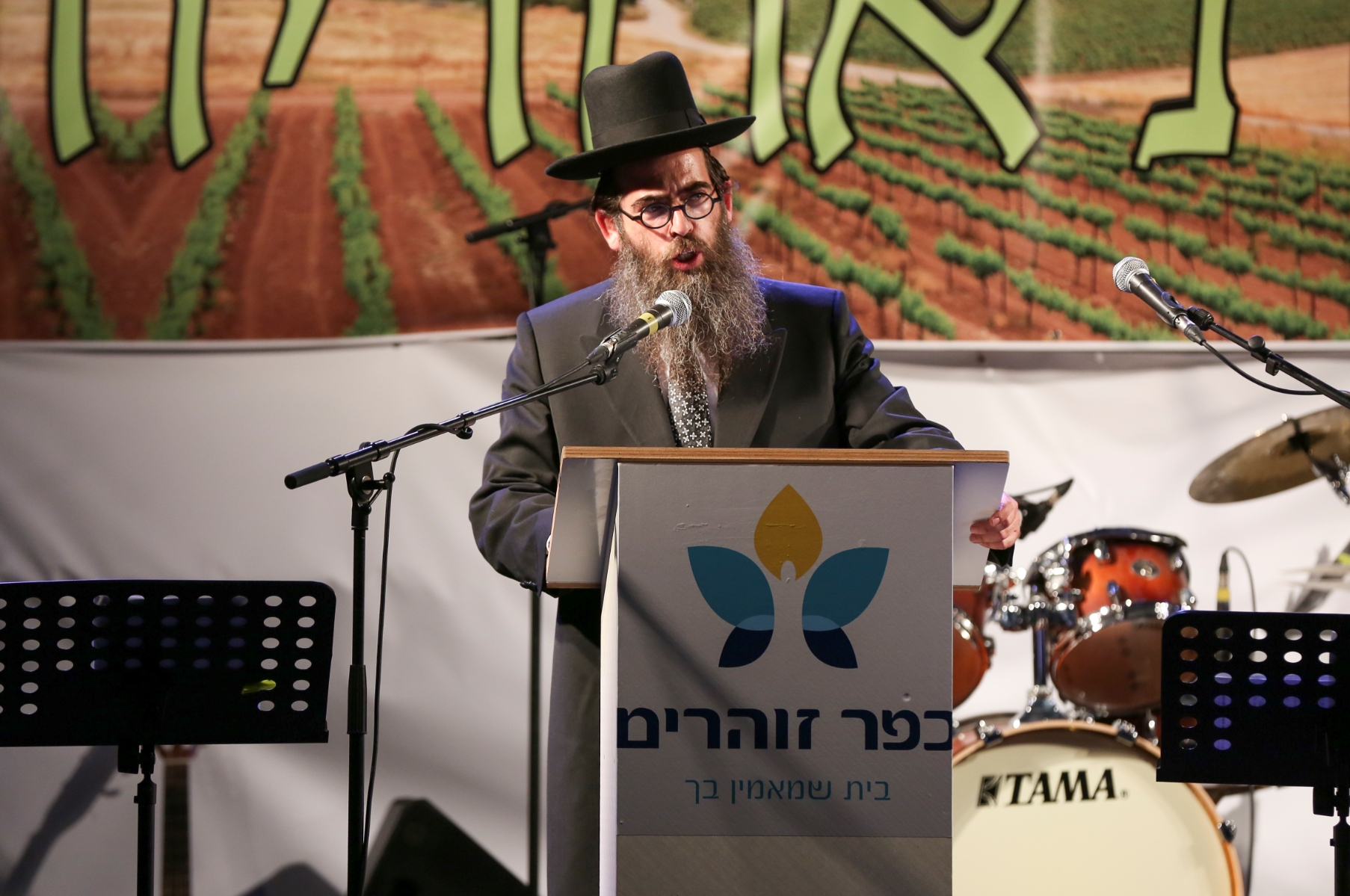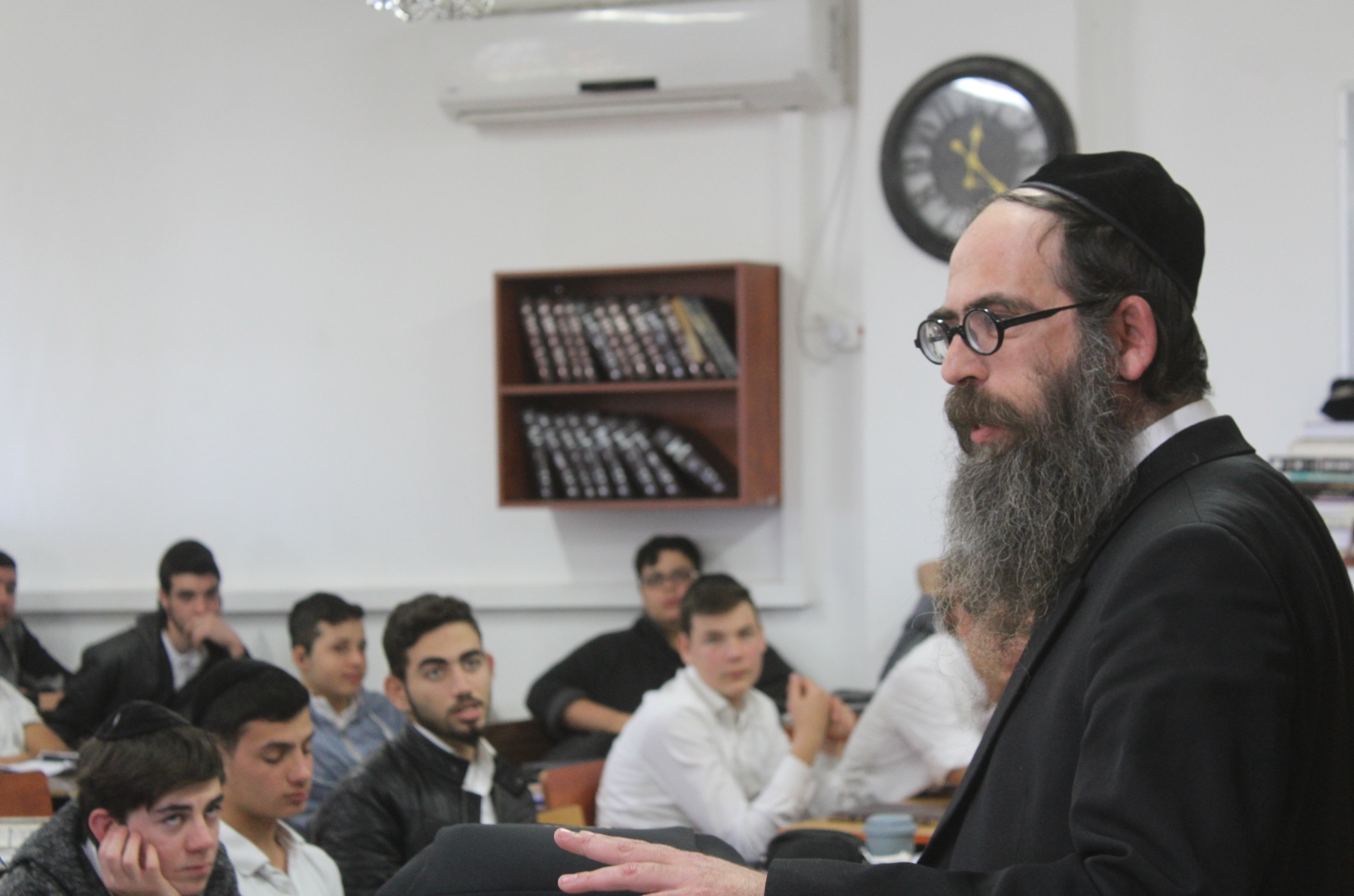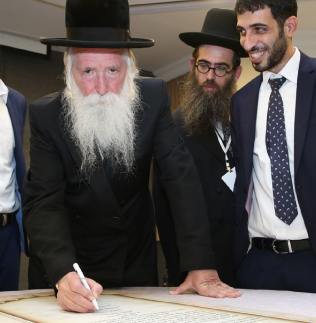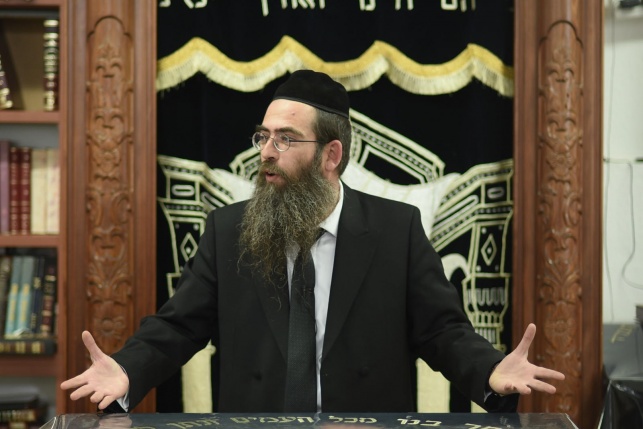Rabbi Yechiel Kassel: "From the Darkness I Decided - I Will Not Give Up"
He has 13 siblings, 10 biological children, 6 foster children, and hundreds of teenagers who owe him their lives. A special interview with Rabbi Yechiel Kassel, the rabbi of the village 'Zoharim'.
 Rabbi Yechiel Kassel, Rabbi of the village 'Zoharim'
Rabbi Yechiel Kassel, Rabbi of the village 'Zoharim'One of the most surprising calls of his life came to Rabbi Yechiel Kassel on the eve of Yom Kippur, just a few hours before the fast began. His deep breath, which he takes slowly, indicates that the story following that call still moves him to this day.
"Six years ago," says Rabbi Kassel, "I received a phone call at ten in the morning, on the eve of Yom Kippur. It was a rabbi from Kiryat Sefer, who told me he had received information about a religious girl, a student at a prestigious seminary from an exemplary home, who planned to meet an Arab man on Yom Kippur night, and leave her family, Judaism, everything.
"The girl had shared her secret plan with a friend, who revealed it to that rabbi. The girl thought that on Yom Kippur night her parents would be preoccupied with the holy day's matters and wouldn't pay attention to her so she could successfully escape. With Heaven's mercy, I quickly obtained her number and immediately called her. From a young age, I've dedicated my life to helping troubled religious youth, and I felt this was a most urgent mission. For me, it truly was about saving a life.
"To my delight, she answered right away, but sounded a little confused. I said: 'Hello, this is Yechiel Kassel, I know about your secret plan, I don't intend to interfere, but all I ask is for us to meet for fifteen minutes today. Let me tell you what's on my heart. After fifteen minutes, you're free to go.' The phone call woke her up, which is why she sounded confused, and she must have been shocked someone knew about her plans. She had no idea where this came from. Moreover, she was very frightened, as her parents didn't know about it and she feared her secret would be out.
"To my surprise, after a short conversation, she agreed to meet. I waited for her a bit, then she showed up.
"We started talking, I explained to her what it means to be Jewish, what Hashem is, what Yom Kippur is, I told her how much Hashem loves her and cares about her, and she responded with hatred in every direction, saying that she thought everyone hated her—her parents, Hashem, her friends, everyone. The conversation lasted five hours, and by four in the afternoon, I realized I was losing this battle. I saw I wasn't getting through to her heart at all.
"Two more hours until the fast began," Rabbi Kassel continues, "I knew what would happen if I couldn't convince her, and then suddenly, blessedly, the words came that finally touched her. I said to her: 'I understand you're angry at the world, and I understand you think everyone is angry at you. But let's look at it from a deeper perspective. I need to be in Zoharim on Yom Kippur, this is a youth village an hour's drive from here, I haven't eaten all day, barely drank, and you think I did all this because I hate you?'
 Rabbi Kassel at Zoharim
Rabbi Kassel at ZoharimI saw something moved in her, and continued to say: 'If you believe I care about you, love you as I love every Jewish man and woman, out of genuine Jewish will for your good, let's continue the conversation after Yom Kippur. And until then, you do nothing.' She listened but said there was no chance. That her plans hadn't changed. I had no choice, I got up, flew home, showered quickly, and drove to Zoharim."
Well, the dramatic peak. How did the story end?
"After Yom Kippur, I received a written message from her. She wrote to me: 'When I left your room I understood that if you love me in Hashem's name, it means Hashem loves me too. So I fasted on Yom Kippur, and I'm waiting for our next talk.' Thank God things worked out well, the girl repented, got married, and has a good husband and a sweet child. We're still in touch occasionally, and I continue to help her as much as I can."
I Cried Like a Baby
Rabbi Yechiel Asher Kassel, married and the father of 10 biological children and 6 foster children, serving as the rabbi of the 'Zoharim' village for at-risk religious youth, was born in Bnei Brak 47 years ago, the eldest of 13 siblings in a Lithuanian family. "My father was a scribe," Rabbi Kassel recalls, "my mother a housewife, and I was a big mischief. Maybe you could even say: 'a bad boy'. Already in third grade I was expelled from Talmud Torah for stealing sweets from the local store and sharing them with friends. I was a cheeky and curious child. That curiosity led me one day to silently go and follow a funeral procession all the way to the cemetery, just because I wanted to see what happened to the body. I was gone for hours, and by the time I returned, my entire family was panicking, fearing I had been kidnapped. That was years ago, but I still remember the commotion it caused.
"When I was 13, hardly any small yeshiva agreed to accept me. It was an awful time, and there were days when I simply didn’t want to live. I went through what’s called 'adolescence' very turbulently and extremely, and at some point I made a decision that with the help of Heaven, despite everything, I would win. I believe those experiences birthed the great sensitivity I have for troubled youth."
 Talking with students
Talking with studentsAccording to Rabbi Kassel, his teenage years were fraught with difficulties and crises. "Throughout those years I was thrown from yeshiva to yeshiva, but despite that, my parents always supported me, even when it wasn’t easy for them. I had attention and concentration disorders, among other problems. This led me to run away from life, to flee from every confrontation. I couldn’t even be alone with myself. Always moving, jumping from one thing to another, always in motion. Constantly running away. At 19, I began to stabilize, and at that time, I started giving classes to householders in Ashdod, working as a counselor in a yeshiva, and saw that people liked hearing from me."
How do you explain the positive, unexpected change in your life?
"I simply decided to be a respected person. I decided to overcome my bad habits and, despite the challenges, change my behavior. I continued my work as a counselor in yeshivas, got married at 22, and although I was still dealing with damages, generally speaking, one could say I began to take the right path. In the subsequent years I was already working as a supervisor in small and large yeshivas, and the guys with the most serious problems always connected with me.
As Rabbi Kassel became more exposed to the many difficulties of troubled religious youth, he became more determined to help them, and it wasn’t long before he took in a foster child. "The first foster child we took in at age 10 was hyperactive to an indescribable degree," he describes. "His parents were separated, he had been passed from several families that couldn’t handle him, and when I was asked if he could come to us, I said yes, not believing it would be long term. In the end, he stayed with us for years and today he's married with a child of his own. Over the years, we took in five more children. The last child we took in was the son of a mentally ill mother. I saw him somewhere, a 4-year-old child, I cried like a baby and couldn’t leave him there."
The First Secular to Finish the Shas
According to Rabbi Kassel, the multitude of difficult cases he encountered didn’t let him rest, forcing him to think more and more about a comprehensive solution to this issue. "I went from one yeshiva to another," he says, "from one educational institution to another, and I couldn’t believe my eyes. I met so many troubled religious youth, dealing with insane difficulties, and I can only imagine how many more there are that I didn’t meet. Although I moved from one yeshiva to another, I tried to keep in touch with the guys from all the places because very quickly I understood that we must support these guys as much as possible.
"I constantly tried to think of additional solutions to the problem and work with a large number of teenagers at the same time, and one day I received a proposal to work in the 'Zoharim' youth village. Rabbi Yitzhak David Grossman was just about to open the place for troubled religious youth and was looking for a spiritual figure for the village. Zoharim is a very serious and unique place. About 100 teenagers live in the village, and it employs 70 staff members. I met with Rabbi Greenbaum, who was responsible for the place, and Rabbi Grossman, and that's how I entered the position."

I once heard that even Rabbi Aharon Leib Shteinman, may his memory be a blessing, was indirectly involved in establishing the village.
"Indeed, at the beginning of my work in the village, I also worked there and at the yeshiva I came from. At the end of that year, I went to Rabbi Shteinman and told him I couldn’t do both, that the load was too great. I laid out to him the considerations for each side, and he said to me: 'Go to Zoharim because this is what you were created for.' And that's it, I've been there for seven years, and in addition, I do other things - I work at the 'Derech Eish' yeshiva of Rabbi Tal in Yad Binyamin, hold personal meetings with yeshiva students facing difficulties, meet with parents, and write a regular column in a well-known religious newspaper about the various problems of religious youth. By the way, I don't charge for meetings with the boys, nor for phone calls with struggling parents. I only charge for meetings with parents."
Speaking of the issues you mentioned, what do you think are the main reasons for their occurrence?
"There can be many reasons, but in quite a few cases, it involves children who were not believed in at all or who weren't believed in enough. A few years ago, I met a young man from an exemplary family who already had both feet in the secular world. He came to a meeting from a very hostile place. His father begged him to meet with me, and somehow he agreed. At the fourth meeting, I asked him if he had a dream he managed to fulfill. He said no, but mentioned he had many dreams he couldn't fulfill, and one that really broke him.
"One of the dreams of that boy was to finish the Shas before marriage. At some point, he was expelled from the yeshiva he studied in, because of various difficulties, and he understood that his dream was buried. I thought for a moment, looked at the young man sitting across from me - wearing jeans and an earring in his ear and said to him: 'Let's fulfill your dream. You're 19, want to get married at around 23, so you have four years to finish the Shas. It's not impossible, it's two pages a day. Every day. I'm telling you, you'll be the first secular person to finish the Shas.
"Suddenly, in a split second, his eyes lit up, and he said if I'd arrange for a yeshiva to accept him, and if I help him, he'd return to faith, wear a hat and suit, and start fulfilling that dream. The young man, thank God, is now married with three children, finished the Shas before his wedding, and very soon he'll complete exams for rabbinical ordination. He believed his dream would come true, and repented at once. Many times a crisis comes when a child doesn't believe in himself, but when I restored his self-belief, he immediately returned to Hashem."
Alongside the serious issues existing within the classic religious youth, Rabbi Kassel also shares the complexity experienced by the children of returnees to faith. "The second generation of returnees to faith more often finds themselves in a world that doesn't necessarily belong to them or that they don't necessarily want, and this invites great crises. Their parents saw a great light, and that's why they returned to faith, but many times they fail to convey it onward. And I tell such parents that they need to act naturally, normally, without fear of 'what will people say', how the community will react, etc. This crazy fear leads to severe mistakes, sometimes with very difficult roads back.
"Even the most religiously observant community today grapples with very tough issues, and it's important to recognize this. We must not sweep the problems under the rug. We need to address them and be aware of them. A teenager growing up in the religious community and is hurt in some way interprets his hurt from the religious community as hurt from Hashem. Our task is to explain to him that it's not Hashem who hurt him, but people."
Blessed is He Who Relieved Me
Rabbi Kassel notes an interesting point: "In Zoharim, the religious requirements aren't high. Just kippah and Shabbat. And yet, a very high percentage of our graduates participate in prayers, put on tefillin, etc., not because we don't impose it on them, but because they genuinely want to serve Hashem. In the village, two things are done – addressing emotional issues and allowing the teens to reconnect with the Creator. To believe in Him again, to know that He believes in them, and to help them believe in themselves."

What's the most important advice on this matter that you can give educators?
"The manner of education is critical, and we place great emphasis on this. Hashem tells us: 'Choose life.' From a young age, children should be taught to choose. The educator's role isn't to train but to educate, from the word beginning. Until age 13, a father is punished for the transgressions of his son, and then says 'Blessed is He Who relieved me of this son's punishment.' Conversely, one becomes liable for divine punishment from age 20 onward. Perhaps we can learn from this that Hashem says to the youth: 'I know in your adolescence you will struggle with many questions and challenges. And I know you will fall along the way. But I'm waiting for you at age 20, after you've gone through what you go through.'
"Therefore, in my lectures to parents," Rabbi Kassel concludes, "I tell them: 'Don't come to me to learn how to be good parents. Hashem gives you the ability and knowledge to raise them. Come to me to gain the self-confidence that will allow you to do it. Do your part, leave everything else to Hashem'.

